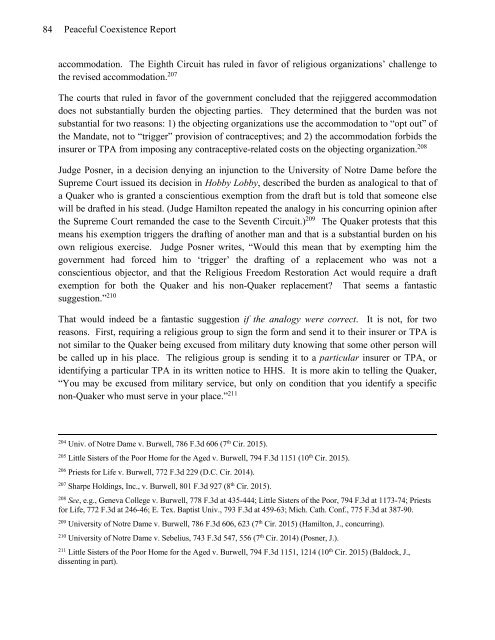PEACEFUL COEXISTENCE
2cgDkdT
2cgDkdT
Create successful ePaper yourself
Turn your PDF publications into a flip-book with our unique Google optimized e-Paper software.
86 Peaceful Coexistence Report<br />
This argument has been ignored or dismissed by other circuits. 216 However, the ultimate fate of<br />
these claims remains unclear. The Seventh Circuit initially ruled against Notre Dame, and then<br />
the Supreme Court vacated and remanded the case for reconsideration in light of Hobby Lobby.<br />
The Seventh Circuit’s second opinion was virtually indistinguishable from its first, which makes<br />
one wonder if the court seriously applied Hobby Lobby. The Supreme Court vacated and<br />
remanded the Michigan Catholic Conference case to the Sixth Circuit, which resulted in the<br />
Sixth Circuit issuing an opinion very similar to that of the Seventh and Tenth Circuits. 217 Since<br />
the Supreme Court remanded multiple cases for reconsideration in light of Hobby Lobby it<br />
seems as though the Court is serious about applying Hobby Lobby to the claims made by<br />
religious organizations. Opinions that mirror the vacated and remanded Sixth and Seventh<br />
Circuit opinions may not be long-lived.<br />
In the Tenth Circuit, the Little Sisters of the Poor did not petition for rehearing en banc.<br />
However, some judge[s] on the Tenth Circuit asked for a poll to be taken as to whether to grant<br />
en banc review sua sponte. 218 The Tenth Circuit denied rehearing, but Judges Hartz, Kelly,<br />
Tymkovich, and Holmes dissented from the denial of rehearing. In his dissent, which the other<br />
dissenting judges joined, Judge Hartz argued that the panel majority’s determination that there<br />
was no substantial burden on religious liberty was contrary to prior precedent. The panel<br />
majority’s opinion either relied on reframing the parties’ religious beliefs 219 or on determining<br />
that the parties’ religious beliefs are unreasonable. 220 Neither is appropriate for the judiciary.<br />
216<br />
Priests for Life v. Burwell, 772 F.3d 229,254-56 (D.C.Cir.2014).<br />
217<br />
Michigan Catholic Conference v. Burwell, 2015 WL 4979692 (6 th Cir. 2015).<br />
218<br />
Little Sisters of the Poor Home for the Aged v. Burwell, Order Denying Hearing En Banc, 799 F.3d 1315, 1316-18<br />
(10 th Cir. 2015) (Hartz, J., dissenting).<br />
219<br />
Id. at 1317.<br />
Where did [the panel majority] go wrong? It does not doubt the sincerity of the plaintiffs’ religious belief. But it does<br />
not accept their statements of what that belief is. It refuses to acknowledge that their religious belief is that execution<br />
of the documents is sinful. Rather, it reframes their belief. It generalizes the belief as being only opposition to<br />
facilitating the use and delivery of certain contraceptives to which they object. Under this reframing, the plaintiffs<br />
have no religious objection to executing the forms; it is just that executing the forms burdens their religious<br />
opposition to certain contraceptives. The burden would be akin to that caused by a tax on sales of religious tracts at<br />
the church bookstore, where the church has no religious objection to paying a tax but complains that the tax will make<br />
it harder to spread the Gospel. After so framing the plaintiffs’ belief, the panel majority then examines the particulars<br />
of the governing law and decides that executing the documents does not really implicate the plaintiffs in the use of<br />
delivery of contraceptives. If one accepts this reframing of plaintiffs’ belief, the analysis of the panel majority may be<br />
correct; perhaps one could say that the exercise of this reframed belief was substantially burdened. But it is not the job<br />
of the judiciary to tell people what their religious beliefs are.<br />
220<br />
Id. at 1317-18.


